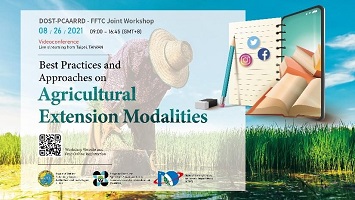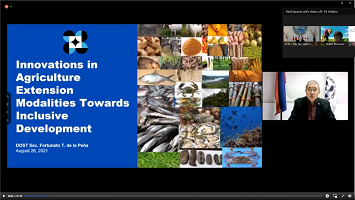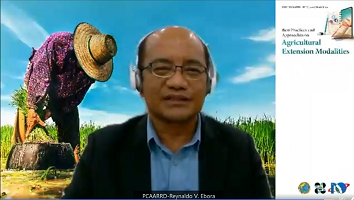 The Department of Science and Technology–Philippine Council for Agriculture, Aquatic and Natural Resources Research and Development (DOST-PCAARRD) in collaboration with the Food and Fertilizer Technology Center for the Asian and Pacific Region (FFTC) and the National Training Institute for Farmers’ Organization (NTIFO) conducted the first International Videoconference on “Best Practices and Approaches on Agricultural Extension Modalities” held via Cisco Webex and Facebook Live on August 26, 2021.
The Department of Science and Technology–Philippine Council for Agriculture, Aquatic and Natural Resources Research and Development (DOST-PCAARRD) in collaboration with the Food and Fertilizer Technology Center for the Asian and Pacific Region (FFTC) and the National Training Institute for Farmers’ Organization (NTIFO) conducted the first International Videoconference on “Best Practices and Approaches on Agricultural Extension Modalities” held via Cisco Webex and Facebook Live on August 26, 2021.
For over 38 years, DOST-PCAARRD and FFTC have had a deep and long-standing collaboration and partnership in implementing different S&T-related activities either held in the Philippines or other partner countries.
During his message, DOST-PCAARRD Executive Director Reynaldo V. Ebora, shared that the forum should have been held in 2020 but was postponed due to the pandemic, hence the shift to a virtual conference. He emphasized PCAARRD’s continuous effort to develop and nurture various extension modalities for a more effective and sustainable strategy to utilize R&D results.
FFTC Director Su-San Chang highlighted that reforms in extension systems are ever-changing due to the “changes in farming types and techniques, farmers’ educational level, national agricultural policy, and the growing awareness on global issues such as environment, technologies or trade.” Dr. Chang emphasized that this videoconference will showcase updated information on the best practices and approaches on agricultural extension systems and technologies used in their respective countries.
Noel A. Catibog, Director of the Technology Transfer and Promotion Division (TTPD) of DOST-PCAARRD, shared the success of the DOST-PCAARRD Techno Gabay Program (TGP), an extension modality that was implemented in the early 2000s, which aims to bring science-based information and technology services to the end-users in the agri-aqua sector. Designed to enhance access to knowledge and technologies by extension agents, farmers, and entrepreneurs, TGP was later adopted throughout the country through the Executive Order signed by President Gloria Macapagal Arroyo in 2009.
 Catibog reiterated that this videoconference is designed to share the diverse experiences and best practices on agricultural extension modalities of different countries in the Asia Pacific region. Further, to serve as an avenue to learn from each other how to better improve the delivery of extension.
Catibog reiterated that this videoconference is designed to share the diverse experiences and best practices on agricultural extension modalities of different countries in the Asia Pacific region. Further, to serve as an avenue to learn from each other how to better improve the delivery of extension.
The videoconference was divided into different sessions tackling: 1) Extension modalities focusing on on-farm productivity, improved marketing, and increase in income; 2) Extension modalities focusing on increasing resiliency through disaster risk reduction and climate change adaptation; and 3) Extension modalities focusing on rural development especially for economically and/or socially disadvantaged areas.
The keynote speaker, DOST Secretary Fortunato T. de la Peña, stressed the critical role of agriculture in achieving the targets of Sustainable Development Goals or SDGs. He expounded on the need to improve the agricultural innovation system and the importance of continuing efforts to innovate, particularly in the delivery of services to farmers and fisherfolk, and other stakeholders.
Among the 13 papers presented were three DOST-PCAARRD funded projects focusing on community development through science and technology community-based farm (STCBF), site-specific S&T-based interventions in undulating and disaster-prone areas in the Cordillera region thru the Science and Technology Action Frontline for Emergencies and Hazards (SAFE), and the adoption of Livelihood Improvement through Facilitated Extension or LIFE model in conflict-vulnerable communities in 3 provinces in Mindanao, Philippines.
The virtual conference served as a venue for exchanging knowledge, experiences, and lessons learned in implementing different agricultural extension modalities in eight participating countries such as Thailand, Taiwan, Vietnam, Indonesia, Malaysia, Japan, Korea, and the Philippines.
 In his closing remarks, Dr. Ebora stressed that “there is no blueprint or one-size-fits-all in the provision of extension services to the farmers.” The participation of the government, be it national and local, non-government organizations, private sector, women, and the youth is vital to continuously improve and sustain any agricultural extension modality.
In his closing remarks, Dr. Ebora stressed that “there is no blueprint or one-size-fits-all in the provision of extension services to the farmers.” The participation of the government, be it national and local, non-government organizations, private sector, women, and the youth is vital to continuously improve and sustain any agricultural extension modality.
The videoconference, which was simultaneously livestreamed in both English and Chinese languages garnered more than 6,000 views on Facebook and a total of 1,033 registered participants on both FFTC website and DOST-PCAARRD Events page.
